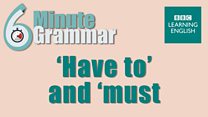Unit 1: English In A Minute
Give us a minute and we'll teach you English
Select a unit
Session 10
Welcome to English In A Minute. Give us a minute and we'll give you a hot tip about English. Grammar, vocabulary... there's so much to learn! And all taught by your favourite BBC Learning English staff!
Sessions in this unit
Session 10 score
0 / 3
- 0 / 3Activity 1
Activity 1
Mustn't vs don't have to
Do you have a minute to spare to learn some English? Watch Kee divulge the differences between mustn't and don't have to! Give us 60 seconds and we'll give you the English!
Watch the video and complete the activity

Kee
Hi guys! This is Kee from BBC Learning English. Today, I'm going to tell you the differences between mustn't and don't have to.
Now, must and have to are similar in meaning. They are both used to describe obligations. However, their negative forms are completely different in meaning.
We still use mustn't to talk about obligations. For example: In the house, I mustn't wear shoes. You know, to keep the house clean.
But don't have to does not describe obligations, so the choice is yours! For example, if your teacher said: you don't have to do your homework, well... then choice is yours. You can say: Alright, I won't!
______________________________________________________________________________________
Did you like that? Why not try these?


 ______________________________________________________________________________________________________
______________________________________________________________________________________________________
Mustn't and don't have to
Modal verbs
Must, mustn't, have to and don't have to are modal verbs. This means they are always followed by a bare infintive verb. Unlike most modal verbs, have to and don't have to change verb form when the subject pronoun changes. For example, becoming has to and doesn't have to or had to and didn't have to.
- I must go.
- We mustn't go.
- You have to go.
- He doesn't have to go.
Must and have to
Both must and have to refer to obligation. They explain what needs to be done.
- You must stop smoking. It will kill you.
- You have to go to school. It's the law.
Mustn't
Mustn't also refers to obligation, but in this case, it tells us what cannot be done.
- You mustn't talk to your mother like that.
- He mustn't leave the house until I come home.
- We mustn't eat any more chocolate.
Don't have to
Don't have to explains to us that there is no obligation to do something. As a result, we have free choice! You can choose to do this thing or not.
- You don't have to go to school if you are sick.
- She doesn't have to come to the party, if she doesn't want to.
- I don't have to know all the moves to win the game!
____________________________________________________________________________________________
To do
Try our quiz to see how well you've learned today's language.
English In A Minute Quiz
3 Questions
Test your understanding of this lesson with our quiz!
Help
Activity
Test your understanding of this lesson with our quiz!
Hint
I mustn't... he mustn't... Is it the same with have to?Question 1 of 3
Help
Activity
Test your understanding of this lesson with our quiz!
Hint
Do must and mustn't both talk about obligations?Question 2 of 3
Help
Activity
Test your understanding of this lesson with our quiz!
Hint
Do we use mustn't or don't have to for a choice?Question 3 of 3
Excellent! Great job! Bad luck! You scored:
Downloads
You can download a PDF document for this episode here.
More
We hope you enjoyed English in a Minute. You can find more episodes here.